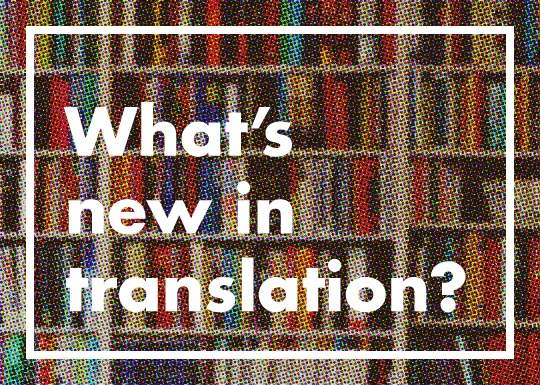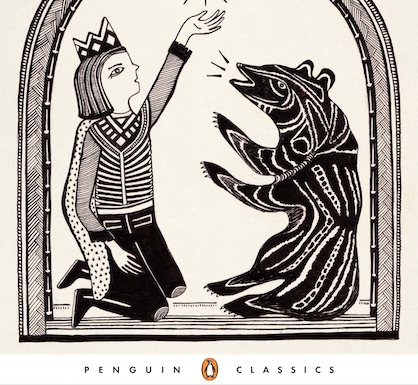Happy first of May, Asymptote readers! On this first of May, readers and observers are reeling at a bit of a scuffle around awards (this happens more rarely than you’d think): a few authors, among them Michael Ondaatje, Rachel Kushner, Salman Rushdie, and Joyce Carol Oates have formally withdrawn from a gala event honoring the French newspaper Charlie Hebdo with its Freedom of Expression award, citing discomfort with the periodical’s inflammatory depictions. If you’re interested in an insider look at the controversy, here’s the letter between the PEN exec and a dissident. Meanwhile, French cartoonist at Charlie Hebdo says he’s withdrawing from depictions of Mohammed altogether, for reasons you may not anticipate. And altogether less contentious is the PEN Manheim award for translation, given to Chinese and Japanese scholar/translator Burton Watson.
Posts by Patty Nash
Weekly News Roundup, 1 May 2015: PEN or Sword?

This week's literary highlights from across the world
Weekly News Roundup, 24th April 2015: Don’t Do This Title

This week's literary highlights from across the world
Happy Friday, Asymptote readers! We say this every week, but perhaps some new vocabulary might spice up your reading experience. We can certainly say that for short stories—steer clear from these overused titles (I’ve certainly read at least five pieces titled “Hunger”).
So many of us battle with the canon—or struggle against it. At the Millions, a piece about reading (and not-exactly re-reading) Russian behemoth’s epic literary tome, War and Peace (wonder what translation she was using?). In present tense, Joseph Brodsky is still making waves: here’s a look at his bestselling biography. And finally, if contemporary Russian literature’s more your thing, be sure to check out this bloggin’ run-down of recent Russian book prizes. READ MORE…
Weekly News Roundup, 17th April 2015: International Excellence!

This week's literary highlights from across the world
Happy Friday, Asymptote friends! We’ve announced it on the blog already, but still can’t stop celebrating at Asymptote having won the London Book Fair’s International Excellence Award for International Literary Translation Achievement. After Indiegogo campaigns, calls for submissions, and projects spanning the entire globe in words, it feels good to be honored.
The prize—and big-time book event in London—couldn’t come at a better time, especially with the slightly disheartening release of translation statistics in the United Kingdom via Literature Across Frontiers. And at the NYBlog, Tim Parks asks if there simply is too much published fiction nowadays—one thing is certain: there isn’t enough translated literature in the English-speaking biblioglobe (not in the slightest!). And if we’re going to data-analyze the literary scene, why not the literature itself? Here’s how computer-driven literary analysis is changing (and how it’s still limited). READ MORE…
Weekly News Roundup, 10th April 2015: BTBA vs. VIDA vs. IFFP?

This week's literary highlights from across the world
Happy Friday! The time has finally arrived for the Best Translated Book Award longlist… After weeks of blog- and social-media hype, both the fiction and poetry longlists have been announced, and we can’t say we aren’t impressed! The lineup includes, among others, several Asymptote friends, like Faces in the Crowd author and blog contributor, Mexican writer Valeria Luiselli, blog interviewee and Translation Tuesday featurette Danish author Naja Marie Aidt, deceased Czech writer Bohumil Hrabal (featured in another Translation Tuesday dedication), Chinese interviewee and Nobel-deserving Can Xue, and many, many more. It’s definitely worth taking a peek through the list—I’ve no idea how the judges managed to narrow it down (at Three Percent, Chad Post laments the books he thought would make it—but didn’t), nor how they’ll be able to pick a winner from such a strong group. READ MORE…
Weekly News Roundup, 3rd April 2015: Judges Bicker, Joke’s on You!

This week's literary highlights from across the world
Happiest of Fridays! Hard to believe we are already entering the fourth month of 2015. But this stretch of spring means we’re well into literary awards season, as well as awards-speculation. Close to our heart, Three Percent‘s Best Translated Book Award is just iiiiinches away from announcing the long-awaited longlist. Want some clues? Tickle your curiosity here and here. And the judges for the United States-based National Book Award have been announced. And in the Morning News’ Tournament of Books, judge Steven Merritt has ruffled feathers with disparaging reviews of Roxane Gay’s An Untamed State and Anthony Doerr’s All the Light we Cannot See. READ MORE…
New in Translation: March 2015

Yan Lianke's The Four Books, Boris and Arkady Strugatsky's The Dead Mountaineer's Inn, and Addendum to a Photo Album by Vladislav Otroshenko
To imagine the Great Leap Forward—an event that began as a febrile dream and ended as an apocalyptic nightmare—tests the limits of the lucid consciousness. In late 1957, Mao Zedong declared that China could “surpass the UK and catch up to the US” through backyard steel furnaces, experimental agricultural practices, and sheer force of will. Village officials vied with each other to promise impossibly high crop yields; newspapers printed staged photos of experimental rice fields planted so densely that they could support the weight of children. Now it’s hard to understand how anyone sincerely believed, or even pretended to believe, that such outcomes were possible. When famine hit in 1958, the crisis was compounded by an unwillingness on the part of the government to admit failure to Mao or to the citizenry. As a result, China exported grain while millions—anywhere between twenty to forty million between 1959 and 1961—starved to death. We may never know the true death toll, as the Great Famine is more taboo a topic in China than even the atrocities of the Cultural Revolution: where responsibility for the Cultural Revolution can be safely foisted onto a group of extremists, the Great Famine is the original sin of the People’s Republic. The Communist Party has therefore consistently sought to efface from public memory the realities of the most lethal famine in human history.
Weekly News Roundup, 27 March 2015: The Knausgaard/Ferrante Personality Test, Leo’d Be Proud

This week's literary highlights from around the world
Whoop, whoop, blog fiends—it’s Friday! You’ve probably already partaken in your fair share of literary personality quizzes (they provide a cheap alternative to psychoanalysis when your insurance goes bad, and it’s always heartening to read you’re more of a Dumbledore than a Malfoy), but the New Yorker‘s article contrasting Italian recluse Elena Ferrante with Norwegian road-tripper Karl Ove Knausgaard is of particular interest to those of us interested in more international literary trends. (Meanwhile, if you’re excited for the English-language release of Book 4 of Knausgaard’s My Struggle, you can read an exclusive excerpt here). READ MORE…
An Interview with the “Turnip Princess” Translator, Maria Tatar

Beyond Brothers Grimm, beyond Hans Christian Andersen: "There's nothing like this collection in English."
The following is an interview with translator Maria Tatar, of Franz Xaver Von Schönwerth’s The Turnip Princess and Other Newly Discovered Tales, available here—and if you’d like a taste, check out our recent Translation Tuesday, featuring the short story “The Enchanted Fiddle!”
Could you talk about the Turnip Princess and what sort of fairy tales they are?
Schönwerth collected his stories from farmhands, domestic servants, artisans —people who worked for a living and were experts in the art of gossip, improvisation, talk, and storytelling. His official work took him into royal quarters, but he was deeply committed to capturing tales told by adults in workrooms and around the hearth. Unlike the Grimms, who were equal-opportunity collectors, begging and borrowing from all social classes, Schönwerth wanted tales untainted by literary influences—hence the rough-hewn quality of many of his stories. He did not smooth out rough edges, add psychological motivation, or make stylistic “improvements.” The Turnip Princess lets us listen in to storytelling sessions from times past. And suddenly, once you’ve read a a dozen or so of these tales, you begin to see how they were put together and animated for audiences.
How did you prepare to translate this sort of writing?
I suppose I could say that I have been preparing for this work all my life. I was trilingual for a brief period as a child, speaking Hungarian, German, and English—never confusing them according to my parents, and thank goodness for that. My graduate work in German Studies took a literary turn, and I did not begin research on folklore and fairy tales in earnest until I started reading fairy tales to my children in the 1980s. Translating the fairy tales of the Brothers Grimm and Hans Christian Andersen for my annotated editions of their work was in some ways actually not the best training ground for Schönwerth. The Grimms and Andersen strive for a carefully constructed folksy tone; Schönwerth by contrast just puts on the page what he hears. I often had to resist the temptation to smooth out the rough edges and create a reader-friendly story. READ MORE…
Weekly News Roundup, 20th March 2015: London Nominees, PEN Nominees!

This week's literary highlights from across the world
Yay, it’s Friday! Here at Asymptote we are especially giddy this weekend because of a gosh-wow shortlist nomination from the London Book Fair—alongside two other notable organizations, Asymptote journal is nominated for an International Excellence Award, for Initiative in International Translation. Keep your fingers crossed for us!—but really, it is such an honor to be recognized for the hard literary work we do. And the PEN Awards longlists have been announced—of special interest to us, of course, are the poetry in translation and fiction in translation categories (we’re happy to note that Danish writer Naja Marie Aidt, blog interviewee, has been nominated—read a selection of Baboon, featured on Translation Tuesday, here)!
Weekly News Roundup, 13th March 2015: Germans hit the Prizes, Hobbit in Hawai’i

This week's literary highlights from across the world
Is it spring yet? It’s certainly Friday, and awards season at the very least: one of our favorite worldwide translation-friendly prizes, the International Foreign Fiction Prize, has announced its longlist, and we’re happy to see some familiar names on the list—of the fifteen nominees, a whopping five of them were translated from the German, including Asymptote friend and alum Susan Bernofsky! German poet Jan Wagner also snagged the top prize for Belletristik at the Leipziger Buchmesse this week, quite the feat in competition with the language’s admittedly high-powered prose! In an altogether more Anglophone bent, the National Book Critics Circle has announced its award-winners, and the list includes Claudia Rankine’s Citizen in the poetry category and LIla by Marilynne Robinson for fiction, and the United Kingdom’s Bailey’s Women’s Prize for Fiction has announced its impressive longlist. READ MORE…
Weekly News Roundup, 5th March 2015: Traveling With Your Censor

This week's literary highlights from across the world
Happiest of Fridays, translation friends! It’s the weekend, so you should let live a little—unless you’re being censored. In the New Yorker, Peter Hessler travels for a week alongside his censor in China. Widespread translation—and proliferation—of literature may be the anti-censorship, and in that case, we’ve witnessed quite a bit of this in the past few weeks across the globe, as French children’s classic The Little Prince runs out of copyright (practically everywhere except for France). In Turkey, dozens of new versions are appearing (and—we hope—delighting!) the reading public.
Happy Friday, friends! Cue shock and awe at the passage of time: February is almost over, and soon we’ll be plucking daffodils in springtime fields. Feel like a summer road trip? Take cues from Norwegian literary bad boy and memoirist Karl Ove Knausgaard’s road trip across the United States (one of his goals is to go without speaking to other Americans—go figure). Here’s the first part of the Saga, in exhaustive detail and translated by Ingvild Burkley. READ MORE…
Happy friday, translation friends! We frequently post all sorts of dispatches on the blog—when the Asymptote family stretches far and wide to connect with other readers all across the globe—but rarely does our team encounter literature under threat. Here’s a report on the Karachi literary festival, in which the Guardian contends that “books really are a matter of life and death.” (they aren’t elsewhere, either?!). And in Egypt, good news for freedom of the press: a high court has granted bail to two Al Jazeera journalists. And Guernica reports on another country in conflict struggling to find voice on the international stage: Syria in image. READ MORE…

